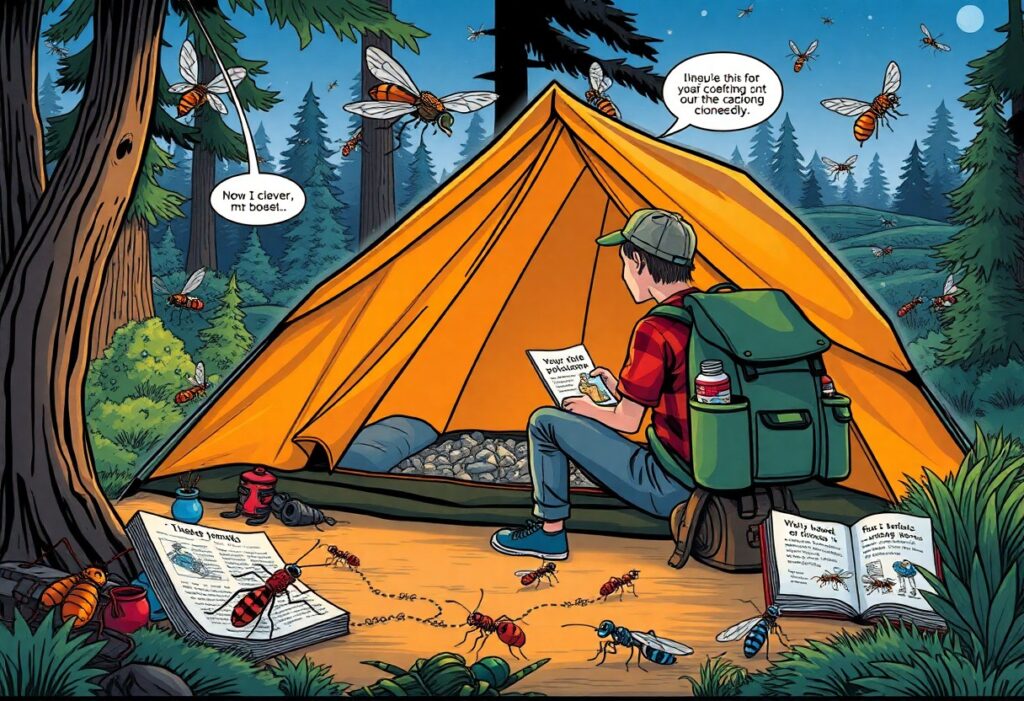Most campers look forward to the beauty of spring, but pesky insects can quickly turn your outdoor adventure into a challenge. With the right strategies, you can effectively keep these unwanted guests at bay, allowing you to enjoy the fresh air and stunning landscapes. In this post, you will discover practical tips to help you combat insects during your spring camping getaway, ensuring a more pleasant experience in nature. So, let’s explore the best ways to safeguard your time in the great outdoors!
Understanding Common Campground Insects
To enjoy a pleasant camping experience, it’s vital to recognize the insects you might encounter. Campgrounds attract various insects that can affect your comfort and safety. Being informed about common species allows you to take appropriate precautions, making your outdoor adventure more enjoyable and less stressful.
Types of Insects to Watch Out For
To protect yourself from pesky bites, be aware of the following insects:
- Mosquitoes
- Ticks
- Ants
- Bees
- Flies
Any of these insects can impact your camping experience, so it’s best to stay vigilant.
| Insect | Characteristics |
| Mosquitoes | Small, flying insects known for their bites. |
| Ticks | Small, blood-feeding arachnids often found in grass. |
| Ants | Social insects that can swarm food and camps. |
| Bees | Pollinators that can sting when threatened. |
| Flies | Annoying creatures that can transmit diseases. |
The Role of the Environment
Behind every insect encounter in the great outdoors is the surrounding environment, which plays a significant role in determining the insect population. Factors like vegetation, water sources, and seasonality influence when and where you’ll find various insects, shaping your camping experience. Understanding these elements can help you better prepare and minimize unwanted interactions with pests.
To effectively manage insect encounters during your camping trip, pay attention to your camping environment. Ensure you select a campsite away from stagnant water and dense foliage, as these areas tend to harbor insects. By choosing an appropriate location, you can significantly reduce the likelihood of coming across bothersome pests and enhance your overall enjoyment of the great outdoors.
Pre-Camping Preparations
If you’re planning a spring camping getaway, taking the time for proper pre-camping preparations can significantly reduce your chances of dealing with pesky insects. Research the area where you’ll be camping, including its bug population, and see what strategies have worked for other campers. This insight will help you pack the right supplies and select your campsite wisely, ensuring a more enjoyable outdoor experience.
Choosing the Right Campsite
Beside picking a scenic location, be mindful of your campsite’s surroundings to avoid areas with stagnant water or thick brush, as these can attract insects. Look for sites that receive more sunlight and have natural repellents like certain plants, which can help keep bugs at bay while adding to your camping ambiance.
Packing Insect-Resistant Gear
After you’ve selected your campsite, it’s time to focus on packing insect-resistant gear to defend yourself against unwanted visitors. Opt for clothing treated with insect repellent and invest in gear designed to deter pests, such as tents with built-in screens and insect-proof netting on hammocks.
This important gear not only provides a barrier against insects but can also enhance your overall camping experience. Lightweight, moisture-wicking fabrics treated with permethrin help keep bugs away while keeping you comfortable. Additionally, consider packing insect repellent sprays for exposed skin and using citronella candles or important oils to create an insect-free zone around your campsite. By being proactive with your gear, you can fully enjoy the great outdoors without the constant nuisance of bugs.
Repellents and Protective Measures
You should consider using effective insect repellents and protective measures to enhance your camping experience and minimize insect encounters. These strategies not only help keep bugs at bay but also allow you to focus on enjoying nature and making memories. With the right products and clothing, you can confidently explore the great outdoors without the nuisance of insects.
Recommended Insect Repellents
The most effective insect repellents usually contain DEET, Picaridin, or oil of lemon eucalyptus. When choosing a repellent, choose a product that offers protection for the duration of your outdoor activities. Apply it generously to exposed skin, focusing on areas prone to bites, such as your arms, legs, and neck. Always follow the instructions on the label for optimal results.
Protective Clothing and Mosquito Nets
Recommended protective clothing includes long sleeves, long pants, and hats, preferably made from tightly woven fabrics. Mosquito nets can also provide an effective barrier, particularly when sleeping outdoors or in areas with high insect activity. Opt for clothing treated with permethrin for added protection, as it can repel and even kill insects on contact.
Measures like wearing light-colored clothing can also help, as it makes it easier to spot insects. Tightly woven fabrics will prevent bites while still allowing you to move comfortably. If you plan to camp in particularly buggy areas, invest in a portable mosquito net that can be hung over your sleeping area. This combination of clothing and nets will effectively minimize your risk of insect bites during your adventure.
Keeping Your Campsite Insect-Free
For a pleasant camping experience, it’s crucial to keep your campsite insect-free. Create a barrier between your living space and the surrounding wilderness by selecting a well-maintained area away from standing water. Use natural repellents and avoid heavily-scented soaps, as they can attract insects. Setting up tents and seating away from dense vegetation can further deter unwanted bugs from invading your space.
Food Storage and Cleanup Tips
With proper food storage and cleanup, you can significantly reduce insect attraction at your campsite. Follow these guidelines for effective pest control:
- Store food in airtight containers.
- Keep cooking and eating areas clean.
- Pack out all trash promptly.
- Use sealed bags for leftovers.
Perceiving cleanliness as the best defense against insects will ensure a more enjoyable outdoor experience.
Natural Deterrents and Traps
The use of natural deterrents and traps can effectively keep insects at bay during your camping trip. You can utilize crucial oils, like eucalyptus or citronella, as natural repellents and create traps using simple household items to catch unwanted insects.
In fact, crafting homemade traps with ingredients like soapy water or apple cider vinegar can provide a chemical-free solution to insect problems. By placing these traps around your campsite, you encourage insects to stay away from your living area. Additionally, consider planting bug-repellent plants like mint or lavender around your site to enhance your defense naturally.
Emergency Treatments for Insect Bites
All campers should be prepared for the possibility of insect bites during their spring getaway. Having an emergency treatment plan can make all the difference in keeping you comfortable and safe. From simple remedies to specific medications, knowing how to respond to bites can help minimize discomfort and prevent complications. Always carry the importants and be informed about how to treat various types of bites you may encounter.
First Aid Essentials
At the campsite, having a well-stocked first aid kit is vital. Ensure your kit includes antiseptic wipes, calamine lotion, hydrocortisone cream, and antihistamines, as these can help alleviate symptoms and reduce inflammation. Additionally, sterile bandages and gauze are important in case of severe reactions. Familiarize yourself with how to apply these treatments effectively to ensure a quick response when needed.
When to Seek Medical Attention
Essentials like identifying symptoms are important when deciding if medical attention is necessary. If you experience difficulty breathing, swelling around the face or neck, or extensive redness and swelling, you should seek professional help immediately. These could indicate a more serious allergic reaction requiring immediate care. It’s important to trust your gut; if something feels off, don’t hesitate to reach out for help.
With insect bites, awareness of your body’s reactions is key. If you notice persistent pain, swelling, or signs of infection such as pus or increased redness, these might warrant a visit to the doctor. Additionally, keep an eye out for systemic symptoms like fever or rash, which may indicate a more severe reaction. Always prioritize your health and safety by seeking medical evaluation when necessary, as early intervention can prevent more serious issues down the line.
Summing up
Summing up, to effectively combat insects on your spring camping getaway, you should equip yourself with insect repellent, wear appropriate clothing, and keep your campsite clean. Utilizing mosquito nets and citronella candles can also enhance your comfort. Consider cooking and eating away from your tent, and making use of natural deterrents like imperative oils. By implementing these strategies, you can create a more pleasant outdoor experience and focus on enjoying nature without the distraction of pesky insects.

